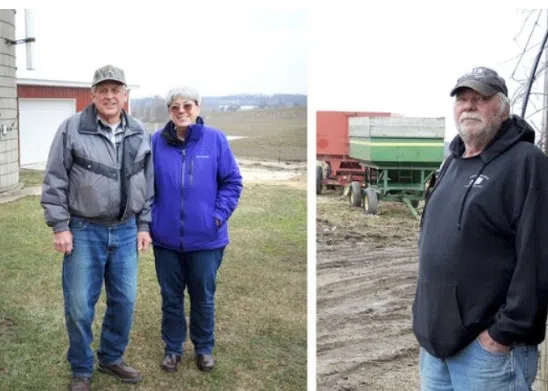West Olive, MI – In a great stride for the Ottawa County Farmland Preservation Program, two local farms, the Holstege and Jongekrijg farms in Zeeland Charter Township, have permanently protected the future of their land for generations to come. Their decision to create agricultural conservation easements ensure 131 acres can be used to produce local food and preserve rural character in perpetuity.
The decision to sell the development rights to their lands underscores their deep commitment to local agricultural industries and land preservation, but it was not a decision made lightly. This effort started years ago, in 2019, when Tom Holstege reached out to Ottawa County’s Department of Strategic Impact. Becky Huttenga, Economic Development Coordinator, and Julie Lamer, Farmland Preservation Analyst, were happy to work with the farmers and local officials on the first steps in the process.
At the time Tom initially reached out, Zeeland Charter Township had not yet passed a resolution to support the Farmland Preservation Program which meant his land didn’t qualify for the purchase of developmental rights. A neighboring operation to Tom’s, owned by Mark and Norma Jongekrijg, was interested in the program as well, and both began to attend township board meetings to encourage officials to adopt the resolution. They got their first win in this process when the resolution was passed, and then they began the work closer to home.
“I was sure there for awhile the last thing I ever planted here was going to be houses. Farmland is going so fast. I’m just really happy I got in the program so that I could preserve the farm.”
-Tom Holstege
Next, both farms had to complete the preservation application. In back-to-back years, the two farmers scored high enough to be selected, and Becky and Julie began working to secure funding for the easements. No County money is spent to purchase developmental rights; the preservation of these properties is made possible by private donations raised by the annual Farms are the Tapas fundraising event, landowner contributions, and state and federal grants. The Jongekrijg preservation received funding from the Michigan Department of Agriculture and Rural Development (MDARD) and the Ottawa Conservation District’s Regional Conservation Partnership Program (RCPP).
The Holstege preservation received funding from the Agricultural Conservation Easement Program through the farm bill. “I was sure there for awhile the last thing I ever planted here was going to be houses. Farmland is going so fast,” Tom Holstege said. “I’m just really happy I got in the program so that I could preserve the farm. That’s my main goal. Not everything’s about money.”
On February 27th and March 19th, 2024, almost 5 years after Tom and Mark’s first inquiries, these farms became protected indefinitely. While the land preservation process can take a lot of paperwork and time, 5 years is a blink compared to the time these lands have been farmed and the time they’ll continue to be farmed. “My grandfather on my dad’s side bought this property in 1937, and my parents purchased it from him in 1951, so it’s got about 13/14 years to go to be a centennial farm. We’re working with my daughter and son-in-law and eventually we’ll turn it over to them,” said Mark Jongekrijg. “I bought this farm from my mother 5 years ago and it was always her goal to see it remain a family farm. I thought ‘If I can do something that always keeps it that way, then that is my goal.’”
In addition, there are many benefits to preserving two neighboring properties. It keeps farmable tracts of land close together, making the agricultural operation more efficient and economical by reducing the distance machinery must travel. It can also increase the environmental benefit in a variety of ways, such as reducing soil erosion, encouraging habitat restoration, and groundwater recharge. The Jongekrijg and Holstege families’ decisions to create permanent easements on their lands shows other farmers there are options to handle the challenges to succession and farmland conversion.
About the Ottawa County Farmland Preservation Program:
Ottawa County is an agricultural powerhouse and one of the fastest-growing counties in the state. The county, alongside local units of government and other stakeholders, is working hard to balance the conflicting interests that come with urban growth and a plethora of successful industries. Unfortunately, a byproduct of progress can include a concerning decrease in farmland as it succumbs to development pressure. Municipalities must think of their master plan for the next two to three decades and how important agriculture is in their landscape.
Once a municipality adopts a resolution to participate in the Farmland Preservation Program, landowners with agriculturally zoned properties may apply to sell their development rights to the county by creating a permanent agricultural conservation easement. The Agricultural Preservation Board then reviews and scores each application and makes the yearly property selections. No county money is used to pay landowners for these rights. The program is completely funded through private donations, state and federal grants, and landowner contributions. Once the permanent easement has been created, the landowner still owns the land.
The Ottawa County Farmland Preservation Program has worked hard to protect the agricultural legacy of Ottawa County by educating the community on the pressure farms are facing and the benefits of creating permanent agricultural easements. So far, eight farms have preserved 697 acres through the Ottawa County Purchase of Development Rights Program. To learn more, please click here and attend the yearly community fundraising event, Farms are the Tapas.
If you are an eligible landowner interested in applying, the current application window is open until April 26, 2024. Click here for application details.

Comments